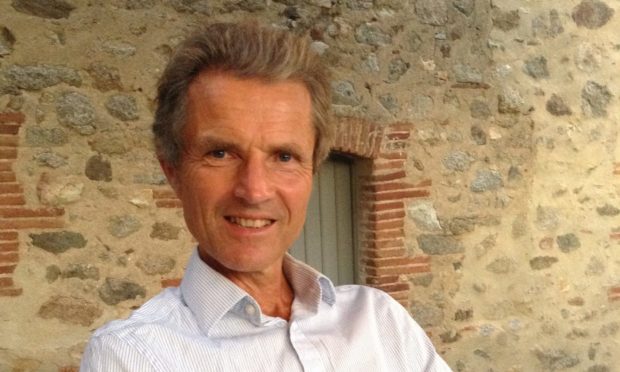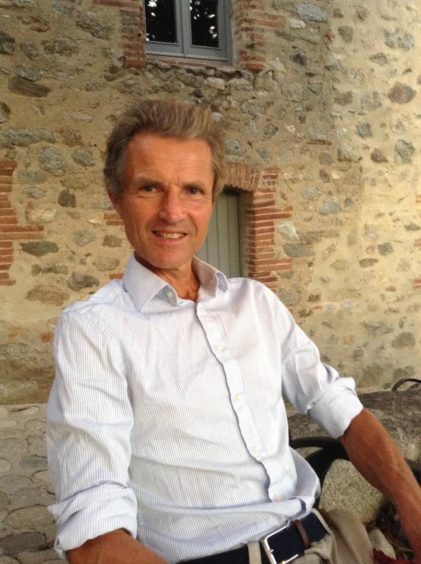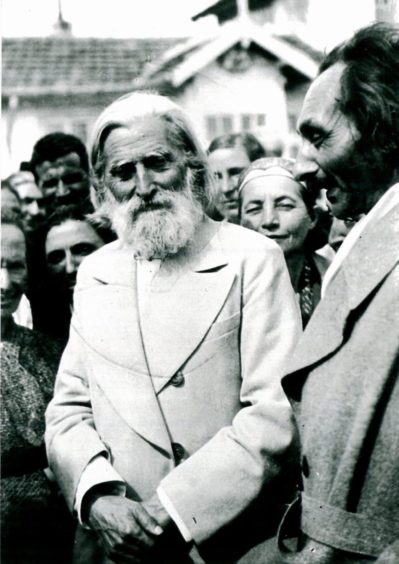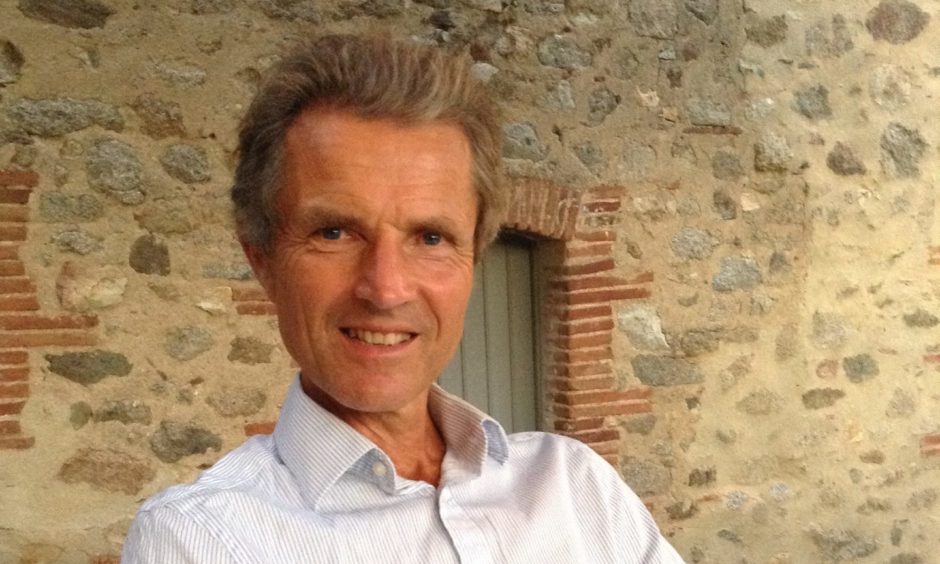Michael Alexander speaks to St Andrews University educated writer, lecturer, poet and editor David Lorimer about his new book A Quest for Wisdom: Inspiring Purpose on the Path of Life.
Visitors to the Scottish National Gallery in Edinburgh might be familiar with the oil painting Ville-d’Avray: Entrance to the Wood by 19th century French landscape and portrait painter Jean-Baptiste Camille Corot.
Corot’s landscapes strongly influenced young Impressionists, and the fresh colour and deftly observed play of light and shadow on the rutted track in this particular piece make it one of Corot’s most attractive landscapes.
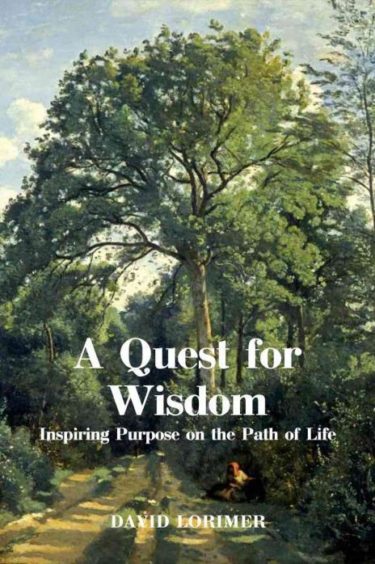
St Andrews University educated writer, lecturer, poet and editor David Lorimer remembers being captivated by the picture on a visit to Edinburgh during the 1970s.
Now, more than 40 years on, he’s chosen it as the perfect image to adorn the cover of his new book A Quest for Wisdom: Inspiring Purpose on the Path of Life.
The book brings together 25 of his highly acclaimed essays, written since 1979, which examine the nature of life and death, questions of meaning and purpose, and the challenge of how we can live more harmoniously together.
Love of Impressionist paintings
“I’ve always loved impressionist paintings,” explains David in an interview with The Courier from his home in south-west France.
“There’s a small collection in Edinburgh.
“I remember seeing Ville-d’Avray: Entrance to the Wood – probably when I was a student in St Andrews in the early ‘70s.
“I was struck by it. I like standing in front of these paintings for one hour just contemplating them.
“Because this book is Inspiring Purpose on the Path of Life, I thought a path going into the wood had a fantastic relationship with what I was writing about.
“It’s a little bit indirect, but it’s also a very beautiful painting.”
A former pupil of Eton who went on to prep school in Edinburgh, David, now 68, studied French and economics plus German and philosophy at St Andrews University.
After graduation, he “followed expectation” and went into merchant banking.
However, after two years he decided it “wasn’t a suitable career” for him and jacked it in.
Inspired by a visit to a friend from St Andrews who was teaching at Charterhouse, David thought this looked like a “very good way of life” and, after some investigations, and a year at Cambridge doing an education course, he became a teacher of philosophy and modern languages at Winchester College.
Opportunity
However, after six “very happy and productive and enjoyable years” at Winchester, he was looking to become more freelance and have more control over his time.
That’s when an opportunity came up with the Scientific and Medical Network which he’s been working for now for nearly 35 years.
That allowed him to structure his own time and really develop his work and interests and have some time for writing as well.
David’s CV charts the trajectory he’s been on since.
He is president of the Wrekin Trust and chief consultant of Character Education Scotland.
He is also a former president of the Swedenborg Society and vice-president of the International Association for Near-Death Studies (UK).
He is the author and editor of over a dozen books, most recently The Protein Crunch (with Jason Drew) and A New Renaissance (edited with Oliver Robinson).
He has a long-standing interest in the perennial wisdom and has translated and edited books about the Bulgarian sage Peter Deunov.
His book Prophet for our Times was re-issued in September 2015 with a foreword by Dr Wayne Dyer.
He is a founding member of the International Futures Forum and was editor of its digest, Omnipedia – Thinking for Tomorrow.
A member of the Royal & Ancient Golf Club at St Andrews since 1975, he was also a trustee of the St Andrews Prize and a Churchill Fellow.
His book on the ideas and work of the Prince of Wales – Radical Prince – has been translated into Dutch, Spanish and French.
He is the originator of the Inspire-Aspire Values Poster Programmes, which this year involved over 25,000 young people.
Inspiring Purpose on the Path of Life
Reflecting back over his career, the essays contained in his new publication A Quest for Wisdom: Inspiring Purpose on the Path of Life, take him right back to that period in the mid-1970s when he was between banking and teaching.
Having already had a student job as a guide in champagne cellars during the mid-70s, he spent a year abroad in France and Germany working in the wine regions and as a furniture van delivery driver.
Armed only with his car and four boxes of books, it’s the reading he did at that time, that formed the basis of a lot of the essays that followed.
Now David hopes that A Quest for Wisdom will inspire readers, as Dr Albert Schweitzer put it, in our common task ‘to become more finely and deeply human.’
The essays are divided into three sections – science, spirituality and meaning; death, consciousness and transformation and then responsibility and ethics.
There’s an entry point for everybody, he says, because some people will be less interested in one of these aspects than others.
Asked, however, if he’s been successful after a lifetime searching for wisdom, David replies: “It’s a very good question!”
Difference between ‘cleverness and wisdom’
He adds: “I think one needs to distinguish between cleverness and wisdom.
“Because wisdom for me is something that you distil from your life experience.
“It’s not only about reading books although you can of course glean wisdom from books.
“I think the search goes on!
“But recently I’ve come across the work of a man called Jeffery Martin.
“He runs something called a Finders course.
“This is a kind of deliberate positioning of finders as opposed to seekers.
“The quest for wisdom implies that you are seeking but the finders implies these people have found what they are looking for which is a state of conscientious in which they feel contentment, happiness, maybe joy and living entirely in the present moment.
“I’m still in a seeking mode if you like although I have been lucky enough to have gleaned a lot of experience along the way.”
Deeper meaning
David says it’s clear “purpose” in life can come in many forms and this underpins the work he does with young people through Inspiring Purpose.
Supported by the Dundee-based Northwood Trust, Inspiring Purpose enables 10-16-year-olds to “explore their character, ideals and values through a unique template using web-based resources”.
“What I’m trying to do there is give them a framework in which they can discover what’s already within themselves,” he says.
“The real meaning of education is to draw that out.
“I have a template which asks them about themselves in terms of their qualities, what they are good at, what they’d like to develop in themselves.
“And then I ask them what inspires them or what project inspires them; I ask them questions about what they want to do, what they want to achieve in their life.
“In the current moment we are doing sustainable futures. What do they think are the best policies for a sustainable future? What are they themselves going to do about it?”
When discussing “purpose”, David differentiates between the metaphysical and a deeper “knowing” about the purpose of life.
Love and wisdom
“A lot of people working in science will say life is all just an accident,” he says.
“Whereas if you look at the deepest experiences that people have such as in near-death experiences, then you find there’s an ‘intelligence’ behind the universe or an intelligence which is consciousness with a capital C.
“It’s also imbued with love and wisdom. And that’s universally what people say when they reach into the deeper structures of reality. It’s that kind of sense of connection for me which is the sense of purpose.
“I’m talking about that deep sense of connection and intrinsic worthwhileness – that there is an underlying purpose to the whole human existence and that’s what I would argue for”.”
With this in mind, David explores the realm beyond practical knowledge.
It’s more what he would call ‘direct knowing’ which in the mystical tradition would be called Gnosis where you “become one” with what you are knowing.
“If you were trying to understand that at another level,” he says, “it’s like contemplating a flower – not observing a flower and dissecting it – but contemplating it so that while you are contemplating it you are ‘at one’ with the flower. That’s what I mean by contemplation.
“In the western philosophical tradition it’s actually recognised as a higher form of knowing and for me, what it all comes down to are these principles of love and wisdom.
“I think that we’re here to learn how to love and to grow in wisdom.
“That’s very much something I’ve learned from Bulgarian teacher Peter Deunov who is the subject of a number of essays.”
*A Quest for Wisdom: Inspiring Purpose on the Path of Life by David Lorimer is published on March 25, 2021 by Aeon Books.
